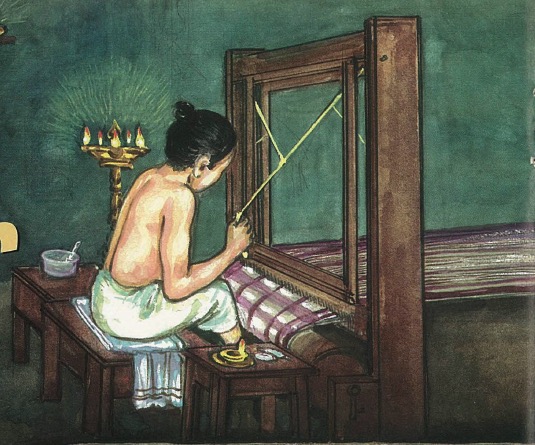The Tirukural, “holy couplets,” is a treasury of Hindu ethical insight and a literary masterpiece of the Tamil language, written by Saiva Saint Tiruvalluvar (ca 200 bce) near present-day Chennai in South India. This sagely compendium of practical advice is so pithy, so profound and so sacred that it is sworn upon today in South Indian courts. The text focuses primarily on the first three goals of life–artha (wealth), dharma (conduct) and kama (desire)–but also includes thirteen chapters on renunciate dharma, relating to life’s fourth goal, moksha (liberation). In an extraordinarily compact verse form of fourteen syllables, the poet presents 133 subjects of ten verses each on relationships, human strengths and foibles, statecraft and more–1,330 verses in all. One of the world’s earliest ethical texts, the Tirukural has been called “a bible on virtue for the human race.”
Although it has been translated into English by many scholars, the Holy Kural has remained virtually unknown in the Western world. There is a similar work, written in modern times by the mystic Kahil Gibran, called the Prophet, which has been widely distributed. Everyone knows and loves this great work. The Holy Kural parallels the Prophet in many ways. Both books speak in profound yet useful terms of love and friendship, of health and death, of joy and sorrow.
Details of Tiruvalluvar’s life are meager. It is known that he was a weaver and that his wife, Vasuki, was the perfect example of devotion and obedience to her husband. Several stories are told depicting the exemplary harmony in their marriage. The Tirukural was his only work, and though it is relatively short, it was sufficient to bring renown to the humble weaver, making him a venerated sage and lawgiver.
The Holy Kural is most useful in everyday life when its verses are committed to memory and meditated upon, quoted freely as one’s very own. One of its greatest benefits is to guide our actions and our thoughts, to direct our purpose in life and refine our interactions with our fellow man. Business, family and personal problems can be resolved in the light of the saint’s wisdom. If something is going along wrong in your life, bring the forces of life back into harmony by studying the Holy Kural and applying its knowledge. That is perhaps its main function–to perfect and protect our lives in the everyday world by preventing mistakes which can cause an unhappy karma, by preventing erroneous attitudes which can bring unnecessary sorrow into our experience. There is nothing in the Kural that has to be obeyed. Each of the couplets contains such insight, however, that we are drawn to it and want to comply with its discernments.
Teach these gems to the children. This advice and admonition, coming from the Sanatana Dharma, the world’s most ancient faith and culture, will enrich every child’s understanding of goodness, right conduct and right thought. It is essential that the values which are the substance of the Holy Kural–the do’s as well as the don’ts–be carried over into the next generation with courage, persistence and fortitude so that our descendants are benefited by these age-old insights into universal laws, humanitarian laws and plain common sense.
The Kural does not contain a single ethical concept or expression that would offend another faith, and thus it is a fine introduction to the scriptures of the East. The Holy Kural is a liberal meeting ground for all religions. It could well be called a Common Creed for the modern world. The selected verses which follow were rendered into modern “American English” by two acharyas of the Saiva Siddhanta Yoga Order at the request of Satguru Sivaya Subramuniyaswami.
The following text are captions of a beautiful art presentation depicting the verses of the Holy Kural.(see hard copy).
Greatness of Renunciates
Behold those who have weighed the dual nature of things and followedthe renunciate’s way. Their greatness illumines the world.
Chapter 3, Verse 23
Asserting Virtue’s Power
Be unremitting in the doing of good deeds. Do them with all your might and by every possible means.
Chapter 4, Verse 33
Avoidance of Envy
Fortune’s Goddess, intolerant of men who cannot tolerate other’s success, Introduces them to her sister misfortune and goes away.
Chapter 17, Verse 167
One’s Duty to Give
Riches retained by big-hearted men Resemble a fruit tree ripening in the heart of a village.
Chapter 22, Verse 216
Destiny
A man may amass millions, but its enjoyment will never exceed that portion allotted to him.
Chapter 38, Verse 377
Unjust Reign
A scepter-wielding king requesting a gift is like a lance-bearing robber demanding, “Give me all you have.”
Chapter 56, Verse 552
Resoluteness of Action
Do not disparage men who appear small, for there are those, seemingly insignificant, who are like the linchpin of a mighty chariot.
Chapter 67, Verse 667
Judging the Audience
Speaking to an audience of thinking men is like watering a bed of growing plants.
Chapter 72, Verse 718
Hatred
Though men plot disunity and deliberately harm you, the highest path plans no hateful retribution.
Chapter 86, Verse 852
Honor
Cultivate modesty in the midst of good fortune, but in times of adversity preserve your dignity.
Chapter 97, Verse 963
Possession of Courtesy
If a man is easy of access to all,then the virtue of courtesy will be easily accessible to him.
Chapter 100, Verse 992
Begging
There are men who never deny a request, even in a dream. Begging from such men is as good as giving.
Chapter 106, Verse 1054
